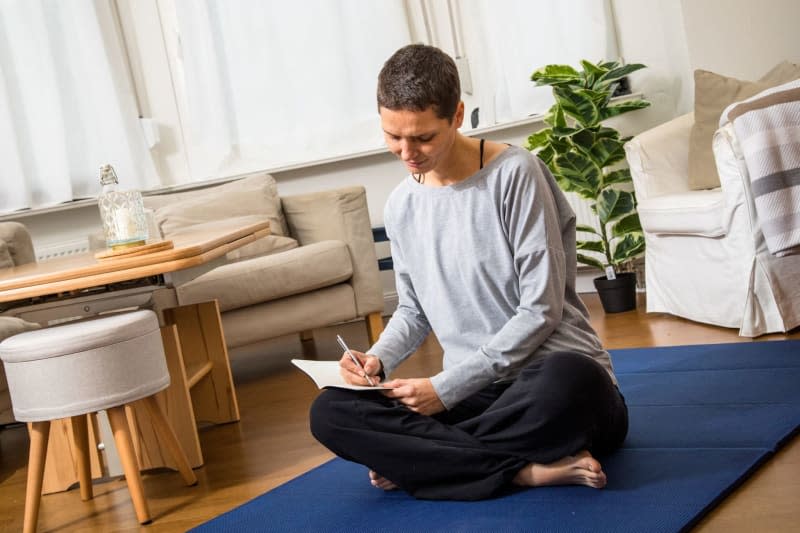How to start the new year with a gratitude practice

Eat healthier, exercise more. Over the years, this has been the steady drumbeat for many when it comes to making New Year's resolutions.
So consider a new alternative this time: Lean into gratitude.
The simple practice holds great promise for improving our well-being - and it's largely free (unlike a gym membership) and easy to start (unlike a diet).
Here's how to take the first step and leverage the power of gratitude in 2024.
Why gratitude
"Psychologically, it's true that we're kind of hard-wired to pay attention to problems and concerns and what's not working," says Anthony Rella, a mental health counselor in North Seattle. He's been a therapist since 2013 and has his own practice working with men, as well as serving the LGBTQ+ community.
"Especially when we're experiencing times of stress or a lot of hardship, we tend to start to fixate on [negativity] a little bit too much," he says.
It's easy to focus on the bad: the economy, stress at work, politics, or even how others are seemingly doing better.
The brain latches on or compares itself to others, starting a negative cycle of thinking that can reify itself. Sure enough, if you look for the bad, you'll find it.
That's why Rella, funnily enough, calls gratitude "weightlifting for your brain," a practice that instead forces the brain to slow down, do "a few reps, to bring more balance to how you see the world."
Working out the brain this way pays great dividends.
"Gratitude can improve our moods," explains Lily Gordon, a licensed mental health counselor associate at Self Space Seattle.
"It can give us some relief from stress and anxiety. It can help us cultivate resilience. It can help us connect with people better, maybe improve our relationships," she said.
Science supports this too
In a 2021 meta-analysis of 62 studies published in the International Journal of Depression and Anxiety, researchers found "a robust connection between higher levels of gratitude and lower levels of depression."
A different 2017 pilot study introduced gratitude journaling to patients dealing with heart failure. Those who participated in the practice had improved biomarkers when it came to inflammation and their variable heart rate — two positive signs of heart health.
Gordon knows people can be sceptical. Still, she encourages her clients to start small and with an open mind.
"It can be awkward at first if you haven't engaged in practices like this before," she says.
"I always encourage people to take a few weeks to start to see any kind of change ... But I think what's really cool about gratitude practices is that they seem to work better over time."
Starting on the bright side
The good news of starting a new practice like gratitude is that there's no wrong way to begin.
You can choose to write down what you're grateful for once a week, or daily if you're up for it. There are dozens of free apps that cater to this specific practice, or you can just use your phone's notes app or leave a voice memo to yourself. You can do it with friends or practice solo; it can take as little as five to 10 minutes.
"In my household when we sit down to dinner, we just take a few minutes and name the things that we're feeling grateful for that day before we eat," Rella says.
While writing it down can be helpful, it's not nearly as vital as how you engage in the ritual.
"I really want people to pause and think about the details, the intricacies around their gratitude," Gordon says.
Be specific if possible. If you're appreciative of your partner or friend for example, what specifically is making you grateful - is it their kindness, patience, their sense of humor?
Slowing down and reflecting on these details is part of what makes this practice so powerful.
If you're struggling to identify what you're grateful for, don't stress too much, and keep it simple.
"Certainly I've had times in my life where I've sat down and just really struggled to think of something to feel grateful for," Rella says. "If it's the same three things as yesterday that's OK."
Rella also cautions that the goal with gratitude isn't of course that it will fix your problems, however small or big they feel, but rather that the urgency changes.
"It starts to feel like 'actually a lot of my life is going well.' And it's OK that this one thing isn't going well, because problems are a part of life," he says.
The beauty of gratitude is that the effects will compound - the more you engage in the practice, the more you'll start finding things to be grateful for, and the more appreciative you'll be when you identify and remember all the gifts in your life.
For Gordon, gratitude is really a way of "touching the present moment." When her clients ask about being more present in their daily lives, about living in the moment, she encourages them to try this exercise.
Being present all the time can be challenging with our modern, busy schedules but framing gratitude as a practice that can help you ground yourself in a moment of reflection, that can be a way of tangibly engaging with the present.
"It's these small moments," Gordon says, "the ones that make up the majority of our day-to-day lives — that for me matter the most."

